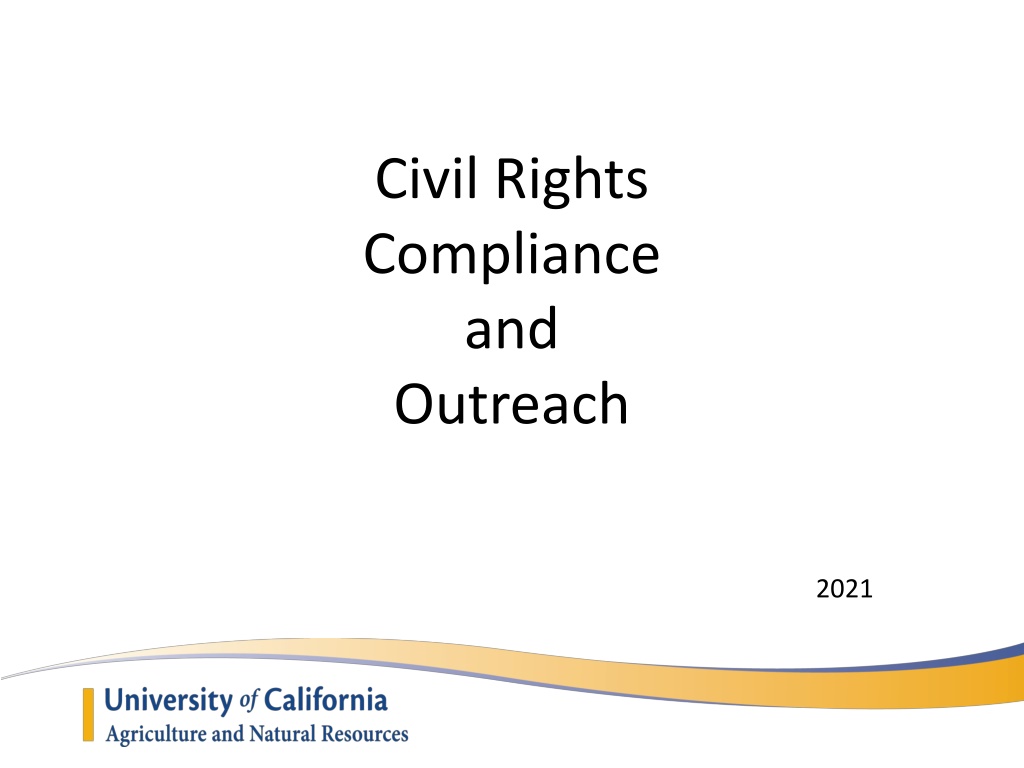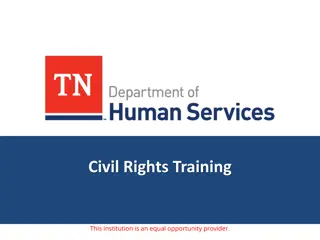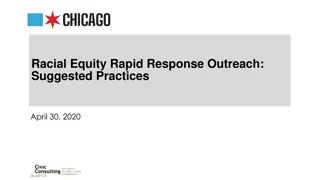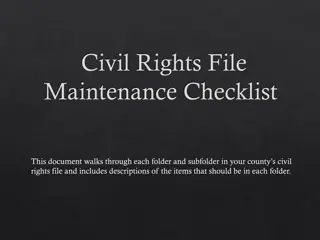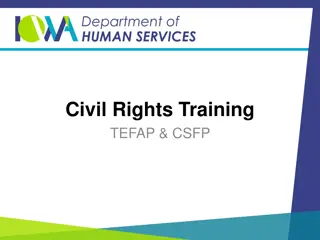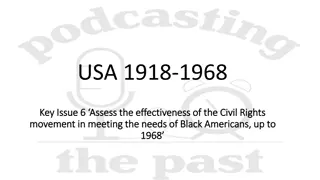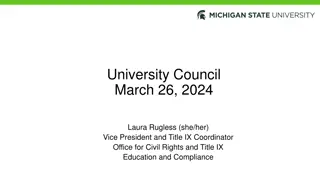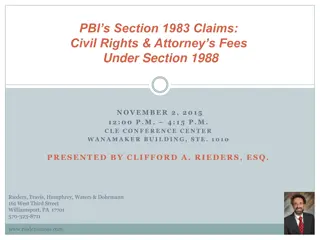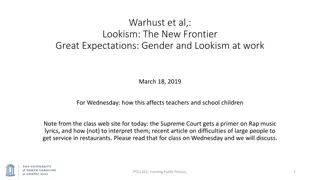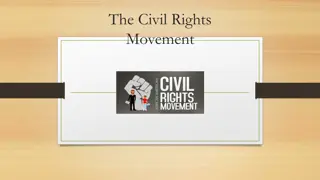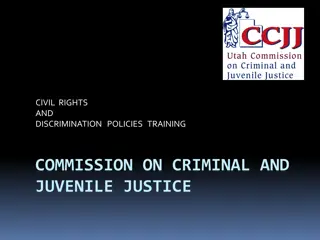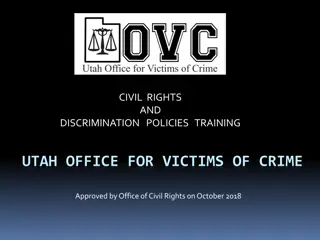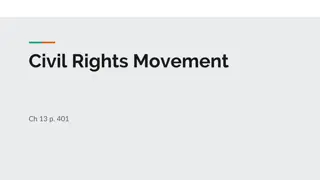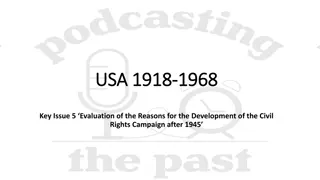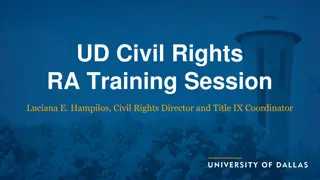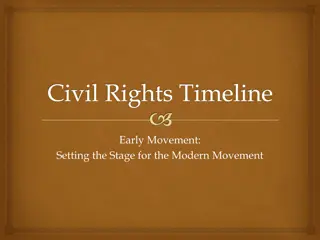Understanding Civil Rights Compliance and Outreach in 2021
Explore the essential aspects of civil rights compliance, including laws, discrimination prevention, and protected classes. Learn why data collection on race, ethnicity, and gender is crucial, and delve into the key regulations such as Title VI of the Civil Rights Act of 1964. Understand the benefits of USDA programs being available to all eligible participants and the importance of non-discriminatory practices in outreach and implementation. Gain insights into various protected class categories and the significance of equal treatment for individuals.
Download Presentation

Please find below an Image/Link to download the presentation.
The content on the website is provided AS IS for your information and personal use only. It may not be sold, licensed, or shared on other websites without obtaining consent from the author. Download presentation by click this link. If you encounter any issues during the download, it is possible that the publisher has removed the file from their server.
E N D
Presentation Transcript
Civil Rights Compliance and Outreach 2021
Objectives The participant will have a better understanding of: Civil Right Laws Recognize and prevent discrimination based on any of the protected classes Civil Rights Compliance Why ANR Collects Data on Race, Ethnicity and Gender How to Collect Data
USDA Civil Rights Benefits of Programs are made available to all eligible participants in a non-discriminatory manner. ANR must implement Civil Rights requirements.
Civil Rights Laws Civil Rights are the rights of individuals to receive equal treatment based on certain legally protected classes.
Civil Rights Laws Title VI of the Civil Rights Act of 1964 No person in the United States shall, on the ground of race, color, or national origin, be excluded from participation in, be denied the benefits of, or be subjected to discrimination under any program or activity receiving federal financial assistance.
Civil Rights Laws Title VI of the Civil Rights of 1964 - Race, Color, and National Origin Sections 503 & 504 of the Rehabilitation Act of 1973 and the Americans with Disabilities Act (ADA), & the ADA Amendments Act of 2008 - Disability Title IX of the Education Amendments of 1972 - Sex Age Discrimination Act of 1975 - Age
Discrimination Different treatment or denial of benefits Either intentionally, by neglect or by the actions or lack of actions Based on the protected classes
Protected Class Categories Race/Ethnicity Color National Origin Religion Sex Gender Gender Expression Gender Identity Pregnancy Disability Medical Condition Genetic Information Ancestry Marital Status Age Sexual Orientation Citizenship Veteran Cannot discriminate on the basis of a protected class
UC ANR Non-Discrimination Statement The University of California Agriculture and Natural Resources (UC ANR) prohibits discrimination against or harassment of any person employed by or seeking employment with UC ANR on the basis of race, color, national origin, religion, sex, gender, gender expression, gender identity, pregnancy (which includes pregnancy, childbirth, and medical conditions related to pregnancy or childbirth), physical or mental disability, medical condition (cancer-related or genetic characteristics), genetic information (including family medical history), ancestry, marital status, family/parental status, income derived from a public assistance program, political beliefs, age, sexual orientation, citizenship, or status as a U.S. veteran. UC ANR policy prohibits retaliation against any employee or person seeking employment for bringing a complaint of discrimination or harassment. UC ANR policy also prohibits retaliation against a person who assists someone with a complaint of discrimination or harassment, or participates in any manner in an investigation or resolution of a complaint of discrimination or harassment. Retaliation includes threats, intimidation, reprisals, and/or adverse actions related to employment. UC ANR also prohibits any reprisal or retaliation for prior civil rights activity. UC ANR is an Equal Opportunity/Affirmative Action Employer. All qualified applicants will receive consideration for employment without regard to race, color, religion, sex, national origin, disability, age or veteran status. UC ANR policy is intended to be consistent with the provisions of applicable State and Federal laws. Inquiries regarding UC ANR s equal employment opportunity policies or our nondiscrimination policies may be directed to either: UCANR, Interim Affirmative Action Compliance Officer, or, Title IX Coordinator, University of California, Agriculture and Natural Resources, 2801 Second Street, Davis, CA 95618, (530) 750-1280. Email: hdapp@ucdavis.edu. Website: http://ucanr.edu/sites/anrstaff/Diversity/Affirmative_Action/.
Retaliation Prohibited Retaliation prohibited against: Individuals who file complaints, Individuals for participating in any manner in an investigation or resolution of a complaint of discrimination or harassment or Anyone opposing discrimination. Anyone because of their political beliefs. Protected Activity
Retaliation Examples Retaliation includes threats, intimidation, reprisals, and/or adverse actions. o Excluding from participating in meetings or projects o Poor performance evaluation o Demotion o Termination/Forced resignation o Refusing to speak to a complainant o Badmouthing the complainant to others o Ridicule or humiliation of the complainant o Refusing to provide a recommendation
Assure Nondiscrimination Assure the same meaningful access to educational information and resources to everyone who participates in your programs.
Why Collect Data Each recipient shall keep such records and submit to the Agency timely, complete and accurate compliance reports at such times, and in such form and containing such nformation, as the Agency may determine to be necessary to ascertain whether the recipient has complied or is complying ... In general, recipients should have available for the Agency racial and ethnic data showing the extent to which members of minority groups are beneficiaries of federally assisted programs. 7 CFR 15.5 (b)
Purpose of Data Collection To determine how effectively ANR programs are reaching eligible persons and beneficiaries. Purpose is to produce data on characteristics of population served and monitor compliance. It is a requirement for ANR to collect Race, Ethnicity and Gender (REG) Data annually. REG data may be checked during civil rights compliance reviews.
Potential Clientele In a given county or program, the potential clientele consists of all those individuals or organizations who have a need for, would benefit from, and who are eligible for participation in any educational activity that might be conducted. The demographic breakdown becomes the baseline for that particular clientele group. The number and percent of persons eligible to participate in programs and related activities.
Actual Clientele Actual participants in the applied research and/or educational programs carried out in the accomplish- ment of the CE program s mission are the actual clientele contacts. The number of contacts (broken down by race, ethnicity and gender) are documented in Project Board. Enrollees in CE programs who are tracked in systems outside of Project Board (i.e. 4-H enrollees, EFNEP participants, Master Gardener or Master Food Preserver volunteers) are not counted as contacts in Project Board in most cases. (Call AA Office for clarification.)
Program Compliance Program Compliance or compliance with federal requirements is achieved when: 1. Parity is achieved 2. If parity is not achieved, then when All Reasonable Effort (ARE) is established 3. ARE should be re-established each year
Program Compliance by . . . Parity Parity or parity of participation is defined by the USDA as when the percentage of each minority group making up your actual contacts comes to within 20% of their percentage in the baseline. For example: Hispanics make up 10% of your potential or baseline. To have parity, Hispanics should make up at least 8% of your actual contacts in order for your program to be in parity for Hispanics.
Program Compliance by . . . All Reasonable Effort (ARE) ARE is the utilization of specific outreach methods in order to expand access and move toward or maintain parity of participation --- Must minimally use 3 of 4 activities to reach potential clientele, moving toward or to maintain parity: All available mass media Newsletters, promotional materials/flyers Personal letters/invitations Personal, face-to-face invitations (or by phone)
Ways to Collect Data It is optional for participants to provide Racial Ethnic, or Gender (REG) information. It is our job to ASK. Self-identification by the applicant/participant is the only recognized method. Helps for REG collection: https://ucanr.edu/sites/ProjectBoardHelp/Affirmative_Action_ _Civil_Rights_Compliance_Training/ Staff may not second guess, or in any other way change or challenge a self-declaration made by the applicant/participant.
Do I need to Keep Records of Who Participates in My Program Yes, you should keep records of clientele who participate in your program There are various contact records you should keep that include the race, ethnicity and gender of the contact (should it be available) Phone and face-to-face meeting logs Emails, letters, correspondence Meeting attendance sign-in sheets Newsletter mailing lists Farmers Markets or open-house type activities if available
Indicators of Possible Non-Compliance Statistical data--percentage of participants by race, ethnicity or gender are out of proportion to percentage of population in the area No ARE activity, ARE not established Organization-type activity--no contacts made in clientele groups defined as organization
Resources More information on Affirmative Action, Civil Rights and Equal Opportunity can be found on the website of the Affirmative Action Office: http://ucanr.edu/sites/anrstaff/Diversity/Affirmative_Action/ David White, Affirmative Action Analyst, Title IX Investigator (530) 750 1286, dewhite@ucanr.edu Project Board help: https://ucanr.edu/sites/ProjectBoardHelp/Affirmative_Action __Civil_Rights_Compliance_Training/
